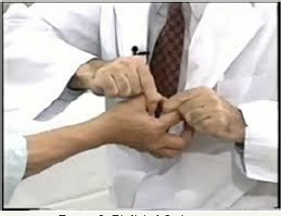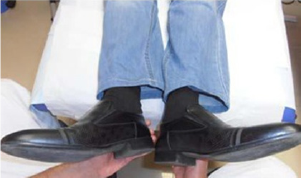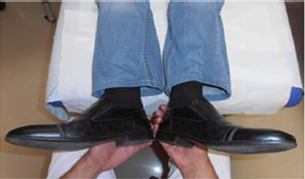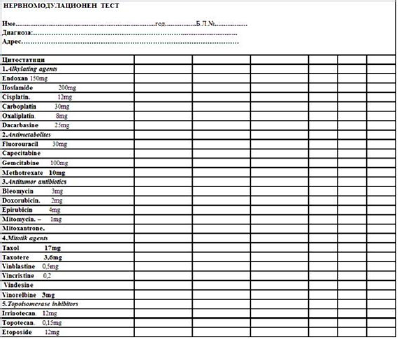- Submissions

Full Text
Advances in Complementary &Alternative Medicine
Personalized Treatment Application in Integrative Oncology
Christo Damyanov*, VI Pavlov and IV Maslev
Medical Center for Integrative Medicine, Bulgaria
*Corresponding author: Christo Damyanov, MD, Medical Center for Integrative Medicine, Sofia, Bulgaria
Submission: December 12, 2017; Published: March 15, 2018

ISSN: 2637-7802Volume1 Issue5
Abstract
The last 35 years statistical data show that the conventional treatment results are not relevant to the patients' survival rate improvement. The concept of standard oncology demonstrates a lot of disadvantages, which remarkably limit the therapeutic effectiveness. Recently a new approach appears to be more interesting: the so called "Personalized Treatment”. Hopefully, this is going to be the basics for achievement of better curable results. Molecular biology advancement has given the possibility of personalized treatment to be implemented. The use of chemo sensitivity tests gives the opportunity for anticancer drugs to be tested and each patient to be treated under personal combination. Another option for testing of anticancer drugs, food supplements and tumor sensitivity are Autonomic Muscular Tests (AMT). The American physician Dr. Omura [1] has elaborated and patented his own AMT (Bi-Digital O-ring Test-BDORT), which is used for diagnostics and treatment in cancer diseases. Since 2012 we have started to use chemo sensitivity test for circulating tumor cells (CTC) and modified version of Dr. Omura's [1] AMT. This article reflects our initial experience in usage of personalized approach in the treatment of cancer patients.
Keywords: Personalized treatment; Cancer treatment; Circulating tumor cells; Chemo sensitivity test; Autonomic muscular test
Introduction
Hundreds of billions USD/Euro are invested in the field of oncology, especially for new chemical agents elaboration and radiotherapy equipment in the latest decades. Statistical assessment of mortality rate deviation for the period 1975-2010 is close to 0% [2]. Standardized mortality rate due to the oncology diseases as per 100,000 persons (divided by cancer location and annual number of patients) according to data, published by Bulgarian Cancer Register for the period 1980-2012 is changed as follows: male mortality: year 1980-118 persons, year 2012-153,4 persons; female mortality: year 1980-77 persons, year 2012-85,6 persons (Figure 1). For the above mentioned period it means that the male mortality rate is increased by 30% and the female mortality is increased by 12% in Bulgaria [3]. Scientific data lead to the conclusion, that both oncology morbidity and treatment effectiveness still remain unresolved. Standard approach to the oncology patients reveals permanently deepening medical, social and economic problems all over the world. Unsatisfactory treatment results in oncology patients are direct consequence from the conventional medical concepts as follows:
Figure 1: Morbidity and mortality from cancer for the period 1975-2010 in the US: A cancer journal for Cl inicians, 2014.

A. The fact, that oncology disease is not local, but systematic health problem has been ignored.
B. The quality of life in treated patients is not a priority.
C. Difficult access to the new alternative methods of treatment.
D. Lack of personalized oncology treatment. German oncologist Josef Issels, who is a pioneer in the field of the integrative oncology states:
Cancer treatment will stay in deadlock because of outdated perceptions used. The concept, that pathogenesis and aetiology must be taken into consideration is one of the main rules leading to the most effective treatment. Symptomatic treatment has never been optimally. To gain best results must be treated the reasons for the diseases. Issels [4] has believed that cancer is a systemic disease requiring a holistic therapy. Such kind of treatment is directed not only to the cancer location but to the overall organism recovery. Thus the significant long term results can be expected. The dogmatic perceptions for the local approach in the treatment of oncology patients lose ground in the last decade. A number of studies conclude the conventional methods must be combined with the complementary and alternative once. Integrative oncology uses both conventional and complementary medicine to meet the needs of individual patients and to focus on the whole person. The core principles of integrative oncology include individualization, holism, dynamism, synergism and collaboration.
Recent tendency that each oncology patient should be cured with individual manner is ignored by the conventional medicine. The statement "one size fits all" the satisfied therapeutic results cannot be expected [5]. All these facts lead to the bad clinical results [6]. Unsatisfactory treatment results in oncology sparkled more and more oncologists to focus on a new opportunity to improve the effectiveness of treatment. A new strategy, called Individualized Cancer Therapy (ICT) has acquired popularity. The main aim and perspective of ICT is to get significant progress in the next primary directions: metastatic treatment, tumor cell chemo resistance and toxicity reduction. Individualized therapy in oncology patients is used by increasing number of oncologists due to the necessity of better curative results [6-8].
Main Body
Personalized approach and chemosensitivity tests
The main priority for oncologists in this new ICT strategy proved use of chemo sensitivity tests. Drug sensitivity compare anticancer activities of candidate drugs on surgically removed samples or blood samples for circulating tumor cell (CTC), and those anticancer drugs showing the best responses are selected for use in succeeding treatments. Since 1950 clinical trials have developed for in vitro and in vivo chemo sensitivity assessment. In vitro tests include cytological and cytochemical drug response evaluation. Most frequently used in vivo test is Sub renal Capsule Assay (SRC) [6,9] Initial clinical results were assessed in 1970 when a number of clinical trials had completed. Practical possibilities of chemo sensitivity test in terms of drugs and methods administration were proved. Significant correlation between the test and clinical results was observed in about 80% of the publications. Increased survival rate was established in less than 25-35% of clinical reports despite this improved treatment effectiveness [5,8]. Clinically the test usage was limited by the tumor cells ability to express its potential for chemo resistance, biological behavior of tumor and metastases and some technological problems [6,10,11]. The progress of molecular biology has provided an excellent possibility for optimal individualized treatment in oncology patients.
Theoretical basics for modern genetics use are the fact that there are specific gene aberrations in different cancer types. Thus, it is possible the anti-tumor drugs sensitivity and tumor cells polymorphism to be detected [6]. Primarily the molecular biology advantages increased the pharmaceutical industry implementation. A lot of drugs were developed and inculcated-the so called target therapy. That kind of therapy could not replace a standard one, but a number of genetic tests were prepared and clinically applied. Tumor genetics studies give the options the genetic differences, biologic behavior and the aggressiveness of the primary tumor and its metastases to be explored [11]. If we pay attention and testing only the primary tumor chemo sensitivity possibly its metastases and the disease overall might be in a progress. The molecular analysis of isolated circulating tumor cells in the blood now can be done. In that way the metastases chemo resistance also can be determined and the personalized treatment will be easily administrated. Moreover, the circulating tumor cell testing gives an option for sensitivity detection also to the natural biologics [12]. Increasing number of laboratories currently propose such kind of tests in their service list. "Research Genetic Cancer Center" (RGCC) in Greece and "Biofocus" are the most popular European genetic laboratories. Dr James Forsythe has represented his 5-years experience at chemo sensitivity test (RGCC) usage in combination with IPT treatment in oncologic patients at the 11th Annual International IPT/IPTLD Integrative Cancer Care Conference. The survival rate for 450 patients (G 4) was 59% for a 33 months exploration period [12]. We have started to use chemo sensitivity test for circulating tumor cells of German laboratory "Biofocus" since 2012. The test was administered in 105 patients who were in G3-4 stage and after failure of chemotherapy and radiation.
Initial results have showed a success in the detection of circulating tumor cells and good correlation with the treatment results in above 80% of cases. After the 10th IPT procedures there is no significant difference in terms of effectiveness with patients who have not been tested, but in the first 3-4 weeks chemo resistance was not reported. The main issue is that the test is too expensive. The price limits of widely test administration in patients who need long term treatment, but the resistance could be expected at the same time. The molecular biology development gives us a new hope and perspective for the improved oncology treatment effectiveness despite we currently cannot use the test as a basic one.
Autonomic muscular test (AMT) and personalized treatment application in integrative oncology
AMT is a diagnostic method, which is basically used in the kinesiology. The method is a biofeedback enhanced physical exam which uses changes in muscle tone as primary indicator. The muscle reaction of Autonomic Nerve System (ANS) is explored in order different functional disorders to be established or drugs and food supplements to be selected. The methodology is used by specialists, working in the field of integrative medicine, acupuncture, naturopaths, holistic dentists and veterinaries [1214]. AMT is known by various names (terms)-Autonomic Response Testing, Neuromodulation Technique, Nutrition Response Testing and Bi-Digital O-ring Test. Since 1964 the Muscle Test is elaborated by Dr. George Good heart, who is chiropractic. He has developed diagnostic system commonly known as Applied Kinesiology. It gives the opportunity muscle reaction to be tested in order to gain diagnostic and clinical results [12].
Figure 2: Bi-digital O-ring test.

German physician Dr. Dietrich Klinghardt has developed and enriched the practical use of kinesiology and has given the term Autonomic Muscular Test. Since 1980 he has improved his systematic model and has applied AMT for diagnostics and treatment of chronic diseases. Theoretically, this model is based on the understanding that human body's physiological response is a result from the physical phenomena "bio-resonance” [13]. In 2002 Dr. Leslie S. Feinberg has proposed a new AMT model and concept which is based on the theory for informative medicine. In 1993 Dr. Omura [15] patented his BDORT (new AMT version) which is used for diagnostics and treatment of chronic and cancer diseases [16] (Figure 2). The BDORT is applicable for the following topics: drugs selection and dosage, assessment of sensitivity to foods and food supplements, evaluation electromagnetic field impact, acupuncture points location, and energetic meridians location [17-23].
The practical results from the application of BDORT for diagnosis and treatment of a cancer have reported in number of publications and international annual symposia [12,18,20,21]. In several clinical studies Dr. Omura [22] has shown the possibilities for tumor diagnostics in earliest stage-when the contemporary diagnostic methods are unable to establish it. Dr. Omura [23] has suggested the test to be administered regularly for 3 to 7 years in a raw, when the test is positive in oncology patients. Dr. Omura [15,17,20] states Bi-Digital O-ring Test provides 90% effectiveness. There is another Dr. Omura's [24] patented technique-”Selective Drug Uptake Enhancement Method” Its potential is different way drugs, immune-stimulants and food supplements to be selected. According to Using BDORT test drugs, foods and food supplements can be selected. We haven't found any written data for testing of anticancer agents [15,18,19]. AMT is used for the treatment of chronic diseases by Mexican physician Dr. Isaac [24,25] method- Bio-magnetic Pairs Therapy. Quite surprisingly to us detection of magnetic imbalance by the method of Dr. Goiz [25] in different areas of the body, which is done with magnetic pairs, may be replaced by AMT which is used verbal communication with the ANS in. AMT completely correspond to the theory Bioresonance phenomenon in which the ANS answer may also include a variety of energetically informattive sources, including verbal (audio frequency) option in [24]. Our research for the use of bio-magnetic therapy in patients with chronic diseases has pointed our interest to incorporate Dr. Goiz’s [25] AMT version for tumor sensitivity establishment. We currently use Dr. Goiz’s [25] AMT to determine anticancer scheme for the IPT procedures.
AMT-Methodlogy.
Figure 3: AMT-initial positioning.

A relaxed patient has lied in comfortable position on couch. Patient's feet are placed outside the couch. A contact with the ANS has occurred by verbal stimulation. The patient's response is relaxation only for one of the legs. That reaction means we have a positive reaction to the given information (Figure 3). We assess the muscle relaxation qualitatively-it might be "very good”, "good” and "mild”. That assessment gives information about the chemo sensitivity. Lack of muscle relaxation means that the reaction is negative and there is chemo resistance to the tested drug. Test time duration is about 15-20min. For the chemo sensitivity registration we fill in a specific blank. At the same time in some patients we have used the test for circulating tumor cells chemosesitivity. It allows both tests results to be compared. No significant differences were established until now. The treatment results in patients cured by IPT and tested by AMT or test for circulating tumor cells chemosesitivity practically were the same. A punctual statistical analysis for the AMT usage could be done in the near future.
Figure 4: AMT-positive response.

Figure 5: AMT-negative response.

Figure 6

Our treatment effectiveness was improved by 10% after the AMT implementation in our practice although patient's clinical profile has got very complicated. These preliminary data should not be considered as statistically significant. The administration of AMT demonstrates some advantages-low price, easy to be done and possibility to be used frequently. Recently we appoint a control test at each 3 weeks during the IPT. Thus we monitor the anticancer drug used. Thereby we determine the anticancer drug chemosensitivity permanently. There is a clear correlation between the test results and subjective state of patients. We can react immediately by changing the drugs scheme especially in complicated patients when the chemo resistance is expected in initial 3-4 weeks. Having received the first positive data from the AMT use we has begun to appoint this Dr. Goiz's [25] verbal (audio) test also for oncology diseases diagnostics. The second step is to estimate the ANS reply to the specific points of magnetic imbalance. Finally we perform a version of Dr. Omura's [23] test and look for the ANS response for the tumor type by placement a histological material onto the patient s hand or palm. Our experience in using AMT for diagnostics has given us some positive results but definitive conclusions cannot be reported currently (Figure 4-6).
Conclusion
The role of pathogenesis and aetiology of oncology diseases is neglected in the last decades. The conventional oncology perception that "one size fits all" doesn't work but the patients' access to the innovations in oncology is seriously limited. That is the main reason for the lack of treatment results improvement. Personalized approach in oncology treatment is in the initial period. Increasing number of integrative and conventional oncologists who are interested to that methodology. Molecular biology advancements have given the possibility for usage of a number of chemo sensitivity tests. They have exposed outstanding opportunities for the treatment improvement. Insufficient scientific data, price and some technological problems significantly limited its administration. Currently the use of chemo sensitivity test for circulating tumor cells is predominant interest and clinical application mainly among physicians practicing Integrative Oncology.
Remarkable interest was observed to the Autonomic Muscular Test elaborated but American physician Dr. Omura [23]. He has patented his own methodology for drugs, food supplements and immunostimulants selection which can be used in the treatment of cancer. The test is not expensive and easy to be done. Initial results from the application of AMT in the treatment of cancer in our practice are promising and give us hope for improving performance. Still limited experience and lack of meaningful statistical data does not allow us at this stage for definitive conclusions.
References
- Omura Y, O'Young B, Jones M, Nihrane A, Duvvi H, et al. (2012) Newly discovered quick, non-invasive screening method of bone marrow malignancies including various leukemias, Hodgkin's lymphoma, non- Hodgkin's lymphoma, & multiple myeloma by abnormality of small rectangular area within bone marrow organ representation areas of the face. Acupunct Electrother Res 37(1): 13-47.
- (2014) Morbidity and mortality from cancer for the period 1975-2010 in the US, Cancer Statistics, 2014. CA: A Cancer Journal for Clinicians.
- (2014) Annual standardized mortality for the period 1980-2012 (World Standard) from malignant neoplasms as per 100 000 persons according to the cancer location. National Cancer Register 23: 138.
- Issels J (1999) Cancer: A second opinion. Avery Publishing Group, 120 Old Broadway, Garden City Park, NY 11040, USA.
- Stevan N (2010) Designing an individually tailored cancer treatment utilizing advanced CTC molecular analysis. Life Extension magazine, USA.
- Mary B (2013) Chemosensivity testing-customizing cancer treatment. Townsend Letter-the Examiner of Alternative Medicine, pp. 1-7.
- DaYong LU, Ting RL, Hong YW (2014) Personalized cancer therapy: A perspective. Clinical & Experimental Pharmacology. 4: 2.
- Younghuang S (2014) Cancer chemosensitivity testing: Review. Journal of Cancer Therapy 5(7): 672-679.
- May W (2012) The future of personalized cancer therapy, today University of New South Wales 3(1).
- Engin U (2006) Drug response assay: an increasing trend in designation of tailored-chemotherapy for more rational management of cancer patients. Adv Mol Med 2(2): 53-58.
- Lu DY, Lu TR, Wu HY, Cao S (2013) Cancer metastasis treatment. Current Drug Therapy 8: 24-29.
- Gin RH, Green BN (1997) George Goodheart, Jr. DC, and a history of applied kinesiology. J Manipulative Physiol Ther 20(5): 331-337.
- Klinghard D, William L (1996) Autonomic response testing (manual). American Academy of Neural Therapy, Seattle, WA, USA.
- Shane R. Human bio-dynamics (Clinical Kinesiology): The complete works of Dr. Alan Beardall. Human Biodynamics, Portland, OR, USA, pp. 1-3.
- Information paper: An introduction to NMT.
- Information paper: Bi-Digital O-Ring Test (BDORT): A new medicine, Omura, MD, ScD, FACA, FICAE, DAAPM, DABFM, FAAIM, FRSM.
- International association of Bi-Digital O-ring test.
- Marilyn KJ (2010) Discoveries made possible by Non-invasive Bi-Digital O-ring test abstracts of 10th Biennidl International Symposium on the Bi-Digital O-ring test Tokyo, Japan.
- Muneyoshi Oka (2010) The effectiveness of the Bi-Digital O-Ring test in integrated medicine. International Symposium on the Bi-Digital O-ring test Tokyo, Japan.
- Omura Y (1994) Transmission of molecular information through electro-magnetic waves with different frequencies and its application to non-invasive diagnosis of patients as well as detection from patient's X-ray film of visible and not visible medical information: Part I. Acupunct Electrother Res 19(1): 39-63.
- Omura Y, Losco M, Omura AK, Takeshige C, Hisamitsu T, et al. (1992) Bidirectional transmission of molecular information by photon or electron beams passing in the close vicinity of specific molecules, and its clinical and basic research applications: 1) Diagnosis of humans or animal patients without any direct contact; 2) Light microscopic and electron microscopic localization of euro-transmitters, heavy metals, Oncogen C-fos (AB2), etc. of intracellular fine structures of normal and abnormal single cells using light or electro-microscopic indirect Bi-Digital O-Ring Test. Acupunct Electrother Res 17(1): 29-46.
- Omura Y (2007) Rapid screening and diagnosis of various cancers from human voice using Bi-Digital O-Ring Test resonance phenomenon between 2 identical substances i.e. between microscope slide of specific cancer tissue & cancer information in the sound of human voice, and detection of myocardial damage & infection from human voice. Acupunct Electrother Res 32(3-4): 235-269.
- Information paper: Biomagnetic fields pathway
- Isac GD (1994) The biomagnetic pair proceedings of VII international conference traditional medicine and folklore. St John's Newfoundland, Canada, Vol. 5.
- Isac GD (2008) El fenomeno tumoral. Universidad Autonoma Chapingo Departamento de Fitotecnia, (3rd edn), Mexico.
© 2018 Christo Damyanov, et al. This is an open access article distributed under the terms of the Creative Commons Attribution License , which permits unrestricted use, distribution, and build upon your work non-commercially.
 a Creative Commons Attribution 4.0 International License. Based on a work at www.crimsonpublishers.com.
Best viewed in
a Creative Commons Attribution 4.0 International License. Based on a work at www.crimsonpublishers.com.
Best viewed in 







.jpg)






























 Editorial Board Registrations
Editorial Board Registrations Submit your Article
Submit your Article Refer a Friend
Refer a Friend Advertise With Us
Advertise With Us
.jpg)






.jpg)














.bmp)
.jpg)
.png)
.jpg)










.jpg)






.png)

.png)



.png)






